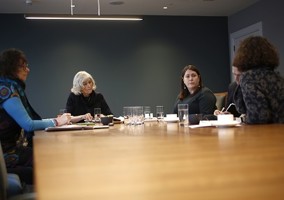Last Friday, the fourth annual Care Day in Scotland, the charity Who Cares? Scotland called on the First Minister to commit to funding a public education campaign to wake people up to the reality of what it’s like to be in care.
Nicola Sturgeon attended an event organised by the charity at Glasgow’s Tramway Theatre, where she heard accounts from three people with experience of the care system about how the discrimination and stigma they had faced as a result of being in care. They asked her to respond to their stories by working with Who Cares? Scotland on a public information campaign to change public attitudes to care.
Sturgeon said that she endorsed the principle of a public education campaign and that her government would work with Who Cares? Scotland and others to shape it. “As chief corporate parent in their country, it’s important that I am your advocate and defender,” she said. “Together we can make this country better for all our young people.”
It was far from the first victory that the advocacy charity had won on behalf of its beneficiaries; in the last five years, campaigns by Who Cares? Scotland have secured several changes to government policy on care. The leaving-care age has been raised to 21, with support until people are 26; care experienced people who meet the minimum entry requirements for university are now guaranteed an interview and, if successful, a bursary; and care experienced people don’t pay council tax until they turn 26. But the greatest achievement was getting the First Minister in 2016 to agree to a root and branch review of Scotland’s care system, with a promise to put love at the heart of any new model.
Who Cares? Scotland (WCS) has also undergone its own transformation in the past few years, culminating in it being named overall winner at the 2018 Charity Awards. It’s a shining example of how putting your beneficiaries at the centre of everything you do can really pay dividends - both for your organisation and for those it supports.
Now just over 40 years old, WCS represents, supports and empowers care experienced people of all ages – those in care, those leaving care and those that have left the system. Its bold strategic vision is “a lifetime of equality, respect and love for care experienced people”. It has contracts with 30 of Scotland’s 32 local authorities to advocate on behalf of its beneficiaries. It runs various groups and activities and provides ways for care experienced people to come together. In its Glasgow head office, there is also an influencing team, a membership team, and a training team. The training division is funded to deliver training to corporate “parents” – bodies named in law to uphold the rights of care experienced people, such as government ministers, local authorities, colleges and universities, the NHS, police, and fire service. But WCS does not provide care services itself – its constitution is very clear on that. Explains chief executive Duncan Dunlop: “Our independence from the care system is crucial, so that when we are asking for changes to it, our only driver for doing so is to improve young people’s experiences.” Development director Marie-Claire Jones adds: “It also means the relationships we hold with young people in care are truly meaningful relationships, as we have no vested interest in their care placement.”
The charity became a membership body in 2013, and now has more than 2,000 members who receive a magazine, attend free events such as the charity’s summer camps, Christmas dinner on Christmas Day and annual Love Rally, and receive a handwritten card from the charity on their birthday each year – a personal touch which consistently ranks among the most valued member benefits. “The most important thing we can offer to our members is a sense of belonging,” says Jones. “They often refer to themselves as being part of a ‘care family’.”
A failing system
There are approximately 15,000 children and young people in care across Scotland, and over 100,000 in the whole UK. In the last 150 years, numerous laws have been passed to try to improve their lives, but studies show that being in care still has a devastating impact on a person’s life chances. In Scotland, young people in care are seven times more likely to be excluded from school; just 6 per cent go straight from high school to university compared with 39 per cent of their peers,
and within five years of leaving care, at least one-fifth will be homeless. A third of all prisoners have been in care.
Says Dunlop: “The care system as a whole has never been a success. If we look back over the lifetime of some individuals, the intervention of care ended up adding to their trauma rather than alleviating it.
“We only prioritise children’s rights when they are at risk of abuse or neglect. We have to radically change the child protection and care system so that abuse doesn’t happen in the first place. If we don’t achieve significant change, then we will continue to fail many children and each generation will have grounds to demand their own abuse inquiries, such as those going on in Scotland and England today.
“If we don’t give agency to a child at all stages in their life then we are not giving them the best chances in life. Until we really respect and laud children’s rights, and their right to be an active participant in their own life, then we’re going to struggle and leave them vulnerable to abuse. Children’s rights must be given parity with workers’ rights, parental rights, family rights – this needs to be formalised in law; we would have far better outcomes.”
Scotland has agreed to adopt the principles of the UN Convention on the Rights of the Child, but Dunlop’s view is that these 20-year-old precepts don’t go far enough. “One issue is that children don’t have the right to be loved,” he says. “The founding principle of care should be to love a child. But that’s one of the problems with the current model of care: most of the relationships are based on a contract, and you can’t have a loving relationship based on a contract, it just doesn’t work.”
The charity has reclaimed the word “love” and uses it proudly in all its communications. “We put so much jargon around children,” says Dunlop, “when actually, their core need is to be loved. People who work in the system can justify not loving a child by not talking about it as a need or right, so we’ve put love firmly back on the table.”
In fact, it’s the driver for last week’s call for a public education campaign, which will promote the need to love children in the care system. Under the current model, says Jones, foster care is marketed as a career option, rather than a loving vocation. This can lead to some people being motivated to take children into their homes for financial reasons. “Our members have told us that in foster placements, they have gone to respite care while the rest of the family goes on holiday. Or the family’s kids will get branded clothes and trainers, while the care experienced kid gets George at Asda because their clothes are being bought from foster care allowances. That creates a sense of inequality of relationship – it doesn’t feel like the loving, nurturing relationship with their carer that children need.”
Awakening of a movement
Empowering care experienced people to find their voice and make it heard by those in power has always been a core tenet of Who Cares? Scotland’s work, but this has taken on a new emphasis since the campaign for change to the leaving-care age. Dunlop explains: “The sea-change was enabling people to go into their 20s and still be connected to the care system, and understanding that what happened to them in care is still affecting their life, and always will. We realised there is actually a care identity. In the same way you have many parts to your identity in terms of sexuality, gender, race etc, the care experience and the trauma you probably experienced in your childhood is not ordinary and has a profound impact on you. And we realised that there’s a whole population of care experienced people, a collective community, 250,000 in Scotland alone, and there’s real value in them coming together and sharing their experiences.
“The experience they had in care will affect all the relationships they ever have – from the professional to the intimate; how they relate to their own children, how they handle crises - all that will be impacted by their care experience, but until recently we never enabled that to be understood as a community. Individuals would go on that journey, but if you have a community of people who can continue with that journey going forward then they can support each other and recognise their power. Once we changed the leaving-care age we were able to look back at the campaign and what we’d learned, and we realised, that was identity politics, a community had come together to demand change - just like every other rights movement – LGBT, race, women’s rights.
“So the true benefit from that campaign wasn’t actually raising the leaving-care age, it was understanding there was a care experienced population and it had power as a connected community which was acting as a liberation movement. Whatever happens now, there’s a recognition that this community exists and it will never be able to be disbanded.”
While it was undoubtedly WCS’s campaigning work that incubated the care experience movement, it has now sprouted wings of its own. Jones says: “It’s heartening to see, even in the embryonic care experience movement, our members are taking themselves into spaces and having conversations without us necessarily paving the way.” She recalls an outdoor advertising campaign last year to recruit new members to the Children’s Hearings System panel, which portrayed potential panel members as superheroes and used the tagline ‘Be a hero for children in care’. “A lot of our members found it quite distasteful, quite deficit-based, and there was uproar on social media. We didn’t lead it, the movement just rose up. And, to their credit, the Children’s Hearings System listened, and the whole campaign got pulled. That sort of thing would never have happened five years ago.”
Radical change is needed
At the same time as the movement was finding its voice, it was dawning on WCS that the incremental policy changes its campaigns were achieving, while desirable and welcome, were never going to fix a system that was so evidently and utterly broken. What was needed was radical, transformational change from the ground up.
So the charity decided that rather than try to improve the system bit by bit, it needed to gather a critical mass and seek a fundamental overhaul of Scotland’s care system. The result was the award-winning 1,000 Voices campaign. “We wanted someone to listen to 1,000 voices of care experienced people and realise why radical change was required and why love was key to that,” WCS wrote in its Charity Awards application form. “Naming it the 1,000 Voices campaign was deliberate. It was a large number of people to listen to, and to turn it down would be to say, wilfully, that you would ignore 1,000 of the most vulnerable, impoverished and marginalised people in Scotland.”
The Care Review
The breakthrough came at the SNP’s party conference in 2016 when Nicola Sturgeon announced the government would review the care system, declared that love should be at its heart, and agreed to listen to the stories of 1,000 care experienced people.
“This was a real commitment,” says Dunlop. “She has personally heard story after story – she’s already listened to over 500 of them.”
By the end of Care Experience Week in October, Sturgeon will be close to her target of listening to 1,000 voices, and the Care Review will have taken all its evidence. Its final report is due in February 2020. Dunlop emphasises that “the review is an independent review and is not our review” but because the First Minister has listened to so many voices and supported WCS’s campaign so publicly, he is optimistic that the political will is in place to implement radical recommendations that will deliver real change.
But WCS is not resting on its laurels. The coming year is crucial for the charity to set out its blueprint for a new, very different care system. As well as last week’s demand for a public education campaign to tackle discrimination against care experienced people, over the next few months WCS will use a variety of tactics to present evidence from 40 years of care experience to paint a public picture of what the best version of care should look like. As the evidence is being collated, at this stage all Dunlop will say is that children in care need to feel like they are part of a loving family, and nothing less will do.
“This needs to be transformational,” says Dunlop. “We’re not interested in tinkering round the edges.”
Is WCS worried that momentum will be lost if there is change of government? “No, because this issue crosses every political divide,” says Dunlop. “It doesn’t matter where you come from on the political spectrum, you understand that a child who isn’t parented can’t be to blame for their lot.”
That said, he is very aware that WCS is currently riding the crest of a wave which won’t last forever, and is determined to make the most of it.
“As an organisation, you need to acknowledge your power and use it. You didn’t get into this to be in politics, but suddenly you find yourself in these spaces, and it’s very interesting. But you also know it’s only for a moment, it won’t last long so you have to empower people to raise their expectations for what they can achieve themselves.”
The power of winning
Winning the overall award at the Charity Awards last year was a satisfying rebuke to those who doubt WCS or the power of the care experienced community, says Dunlop. “Getting this award was a very useful bit of prestige and legitimisation and credibility. When you’re trying to give a different narrative to an entrenched system, the system does fight back to try and maintain the status quo.
“It’s also given respect to the care experienced community. People used to say it wasn’t safe for them to own their care identity or to give them a voice. Well-intentioned people would say ‘let’s not re-traumatise them by hearing their story’ and ‘let’s not connect them with other care experienced people because no good will come from that’. When you’re doing something like this you do get a lot of pressure and that can lead to doubt. But winning this award has really reinforced that we’re on the right track.”
Jones adds: “It’s been hugely motivating for our staff and members to see this recognition on a UK level, as it’s easy to think of ourselves as just a charity in Scotland. It was an overwhelming achievement for us, a real celebration. We set up a selfie station in reception with balloons in the shape of 1,000 and a plaque on an easel saying ‘Charity of the Year’. We sent word to our staff and members that they could drop in any time that week and have their photo taken, and that was really popular. It was important to us that this was felt as a shared achievement, not just for the organisation but for our 2,500 care experienced members too.”
|
Related articles












